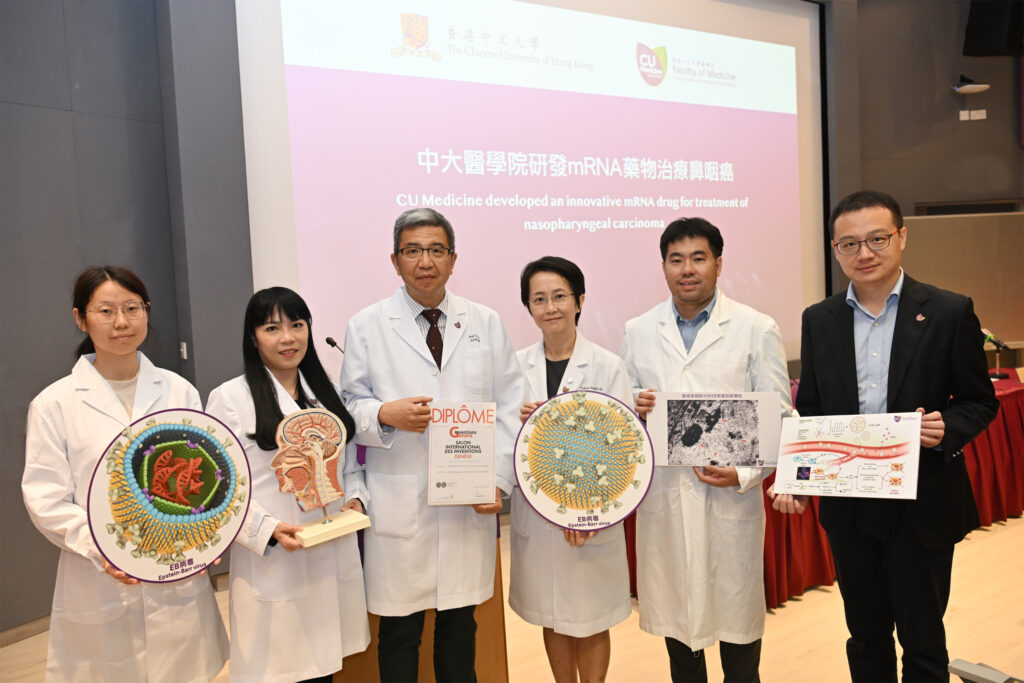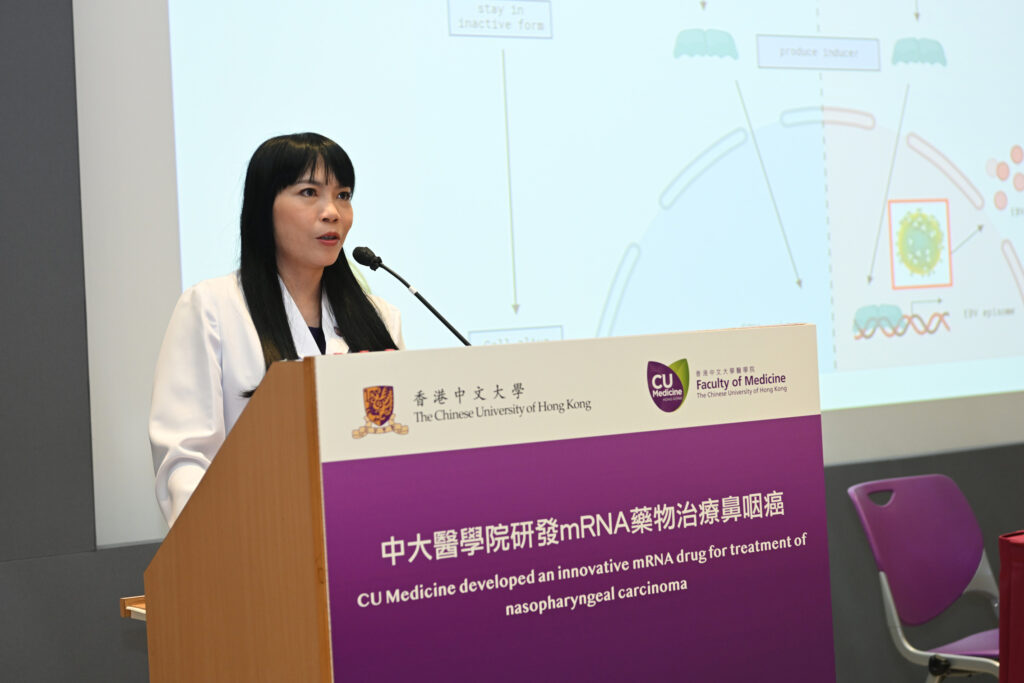CUHK
News Centre
CU Medicine developed an innovative mRNA drug for treatment of nasopharyngeal carcinoma
Nasopharyngeal carcinoma (NPC) is a cancer type strongly associated with Epstein-Barr virus (EBV) infection. The Chinese University of Hong Kong (CUHK)’s Faculty of Medicine (CU Medicine) saw the potential of EBV as a therapeutic target and successfully developed an innovative mRNA drug for treatment of NPC targeting EBV-carrying cancer cells. Researchers observed promising outcomes in mouse model, suggesting that the novel drug can work in synergy with immunotherapy and serve as a treatment option for other EBV-associated cancer types. The findings were recently published in Nature Communications.
EBV as a tumour therapeutic target
NPC, known as “Canton tumour” due to its high prevalence in Southern China, is the most common head and neck cancer in Hong Kong. According to the data of the Hong Kong Cancer Registry in 2021, NPC ranked 9th among the most common cancer types in men and 10th in mortality, with over 550 registered new cases. Notably, NPC is the most common cancer in the 20 to 44 age group of Hong Kong males with over 110 cases.
The stage of NPC is an important prognostic factor influencing survival. The overall 5-year relative survival drops from over 90% at early stage to less than 50% at advanced stage. However, treatment options for NPC patients with advance disease or recurrent and metastasis tumours are limited as targeted therapy for NPC-specific mutations is not yet available.
Professor Lo Kwok-wai, Professor in the Department of Anatomical and Cellular Pathology at CU Medicine, said, “CU Medicine has played an instrumental role in the study of NPC over the past two decades, unraveling the whole genome of NPC and proving plasma EBV DNA screening as an effective diagnostic tumour marker for the early detection of NPC. In this study, we further explored the potential of EBV as a tumour therapeutic target and successfully developed a novel drug by using mRNA technology.”
The mRNA lipid nanoparticle induces detonation of EBV-positive cancer cells
Researchers from the Department of Anatomical and Cellular Pathology at CU Medicine collaborated with The Jackson Laboratory in the US to develop a synthetic mRNA drug to switch on an EBV-specific suicide mechanism to kill the NPC cancer cells. A lipid nanoparticle encapsulating nucleoside-modified mRNA which encodes an artificial transcriptional activator named mTZ3-LNP is synthesised for the mRNA-based EBV-targeted therapy.
Professor Anna Tsang Chi-man, Assistant Professor in the Department of Anatomical and Cellular Pathology at CU Medicine, explained, “Once EBV enters our cells, the virus can remain in a latent state and stay inactive. Upon reactivation, the virus enters lytic cycle and its host cell dies along with this process. The lipid nanoparticle we developed acts like a switch to activate the lytic cycle and induces detonation. From the study results, we showed the potency and safety of treatment with the activator to suppress tumour growth in EBV-positive cancer models.”
Professor Lo added, “mRNA drugs have been tried out in therapy of several cancer types, including liver cancer. We pioneered the trial of mRNA technology in NPC treatment and were delighted to see promising results in mouse model, without resistance. Since the drug targets EBV-positive cancer cells, fewer side effects are expected compared with chemotherapy which doesn’t only kill cancer cells. We anticipate this novel EBV-targeted drug can work in synergy with immunotherapy for better treatment outcome. Other than NPC, the nanoparticle can also serve other EBV-associated cancer types.”
This study was funded by the Innovation and Technology Fund, Health and Medical Research Fund and Research Grant Council’s Areas of Excellence Scheme.

CU Medicine collaborated with The Jackson Laboratory in the US to develop an innovative mRNA drug for treatment of nasopharyngeal carcinoma (NPC) targeting (Epstein-Barr virus) EBV-carrying cancer cells. Researchers observed promising outcomes in mouse model, suggesting that the novel drug can work in synergy with immunotherapy and serve as a treatment option for other EBV-associated cancer types.
Research team members include (2nd from left) Assistant Professor Anna Tsang Chi-man and Professor Lo Kwok-wai from the Department of Anatomical and Cellular Pathology at CU Medicine; Professor Brigette Ma Buig-yue from the Department of Clinical Oncology at CU Medicine; Dr Albert Wu Cheng from The Jackson Laboratory; and Dr Li Lixian, Associate Professor from the Department of Surgery at CU Medicine.

Professor Brigette Ma says the stage of NPC is an important prognostic factor influencing survival. The overall 5-year relative survival drops from over 90% at early stage to less than 50% at advanced stage.







